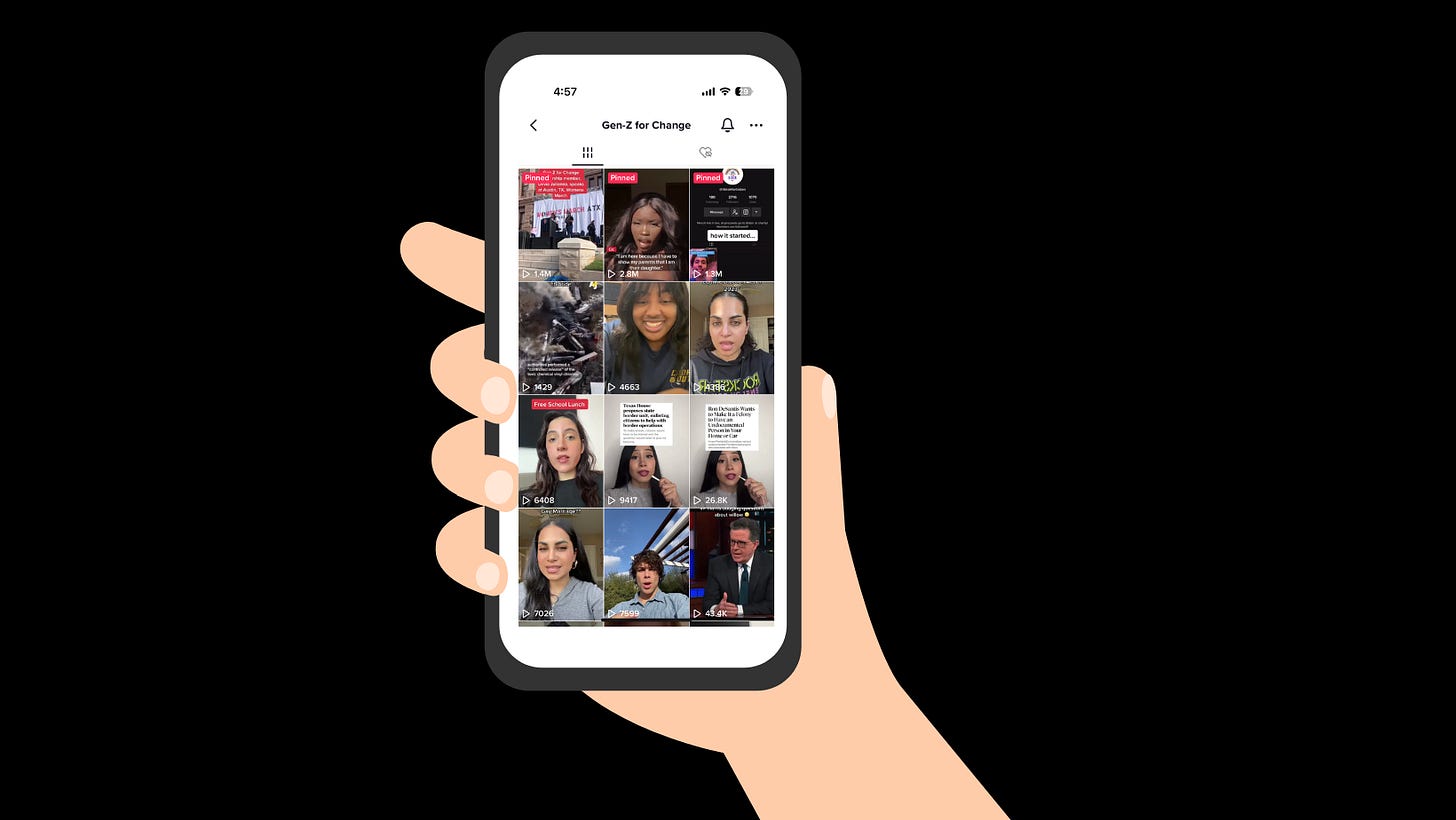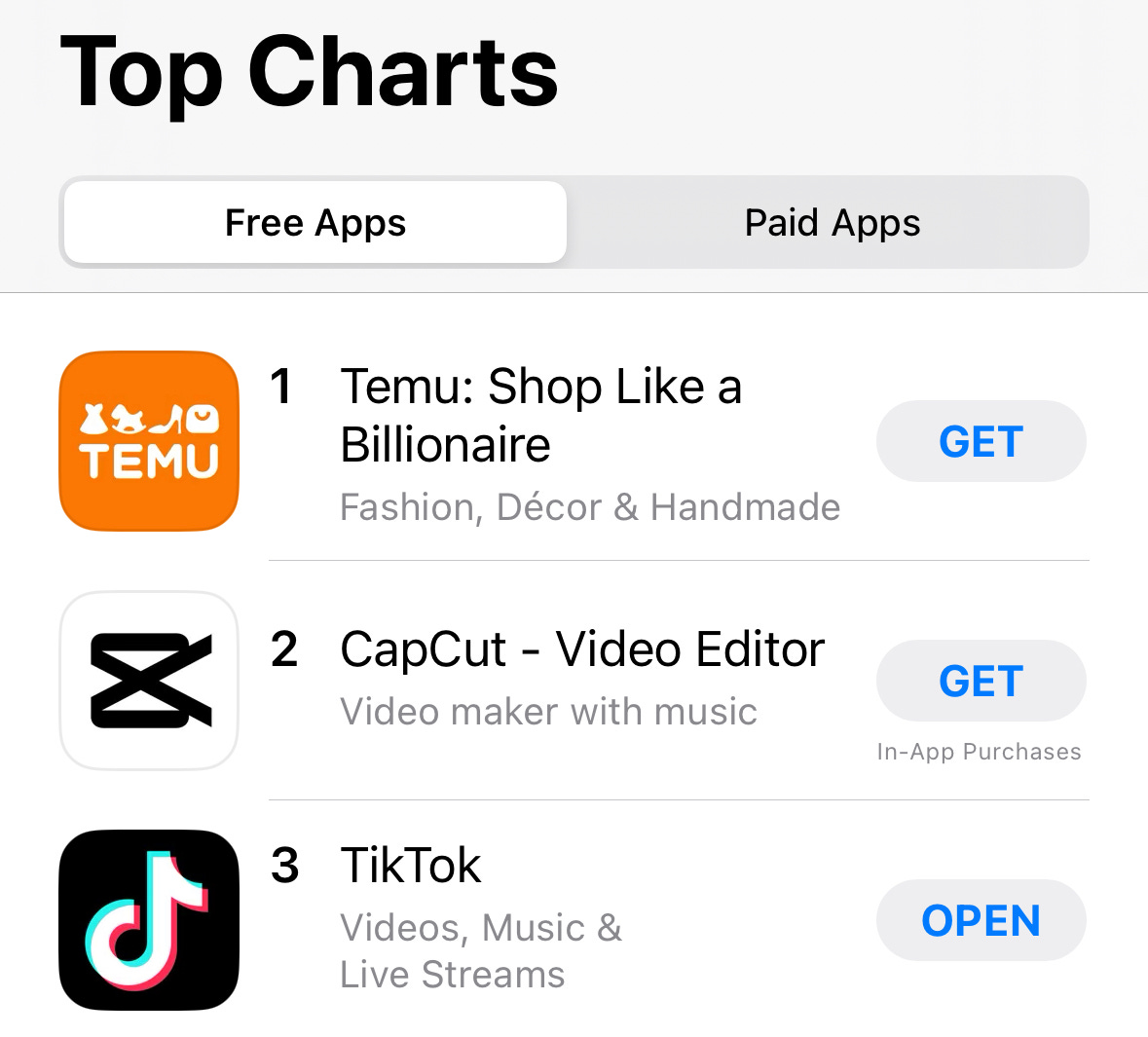What a TikTok ban could mean for young voters...
"An entire voting block will be informationally displaced," says Gen Z for Change's Olivia Julianna 📲🤳📥
If you’re anything like me, your social media feeds are flooded with content about the Capitol Hill TikTok hearings. ICYMI, today, TikTok CEO Shou Chew testified before Congress over the Chinese-owned app’s ties to the country’s government and what that could mean for US users’ data.
The high-stakes hearing has been covered extensively by mainstream media. After all, TikTok was the most downloaded app in the country last year — and it’s currently the number three free app on the Apple App Store chart. Meanwhile, US officials have warned that China could press TikTok to hand over user data — sparking privacy concerns. The company is also under investigation by the FBI and DOJ over accusations of spying on American journalists.
Though it soared to popularity as an app for young people, in reality, TikTok is a favorite for users of all ages. But as D.C. lawmakers appear ready to ban TikTok, young people and content creators are front and center in the push to stop them. And yesterday, pro-TikTok advocates got a boost from Democratic Rep. Jamaal Bowman, who held a press conference opposing the ban along with over 20 social media creators. Bowman has over 160,000 followers on the app. According to Bowman’s office, the group of creators he teamed up with has a combined following of over 60 million people. The group included creators like Gen Z for Change’s Aidan Kohn-Murphy and Under The Desk News’ V Spehar.
“The rush to ban TikTok sets a dangerous precedent for our country by undermining our freedom of speech and distracts from the real issue: protecting Americans’ data and privacy,” Bowman said in a statement, adding that his crusade is “not about defending TikTok as a company.”
The Democratic Congressman used his remarks to push for what he’s calling, “strong regulation that applies to every platform in order to protect our data and especially our children.”
“Let’s use this moment to craft a comprehensive approach to safeguarding and democratizing the social media landscape,” he said.
In 2020 and 2022, TikTok became ripe with political activism. And while political organizers would only be a small fraction of those impacted by a ban (I wrote a piece for Teen Vogue about how state-level TikTok regulations are already impacting on-campus content creators, some of whom rely on the app for work), youth operatives are sounding the alarm bells over what that ban could mean to the youth electorate.
“I fully believe that if TikTok is banned that Joe Biden will lose the 2024 presidential election. Not because Gen-Z is shallow and would disregard Democracy because of an app, but because the reach and lifeline to voters 18-34 would be hemorrhaged. You will not find these voters on twitter or Facebook or instagram. You will lose contact with them. They aren’t watching cable and they’re not reading the newspaper. An entire voting block will be informationally displaced,” Olivia Julianna, who serves as Gen Z for Change’s Director of Politics and Governmental Affairs, told The Up and Up.
Julianna said that she views today’s hearing as a political stunt, distracting the country from a very necessary conversation about regulating Big Tech.
“The TikTok hearing has been full of political posturing from Republican lawmakers seeking to utilize anti-China sentiments rather than have a productive conversation about digital safety and the monopolization of Big Tech. This is not a TikTok problem, this is a lack of thorough investment into comprehensive policy problem,” Julianna said.
Though Julianna mentioned GOP lawmakers, Democrats have shared their concerns with the app, too. And last year, President Joe Biden signed a bill banning TikTok from government devices.
“Facebook, twitter, YouTube, google, Amazon all have posed threats to user data and American’s privacy,” Julianna said.
Gen Z for Change, which has 1.6 million followers on TikTok, initially started in 2020 as a group of content creators called “TikTok for Biden” — it later morphed to the organization its known as today, tackling issues from LGBTQ+ rights, to climate change, workers’ rights, abortion access, and college affordability.







